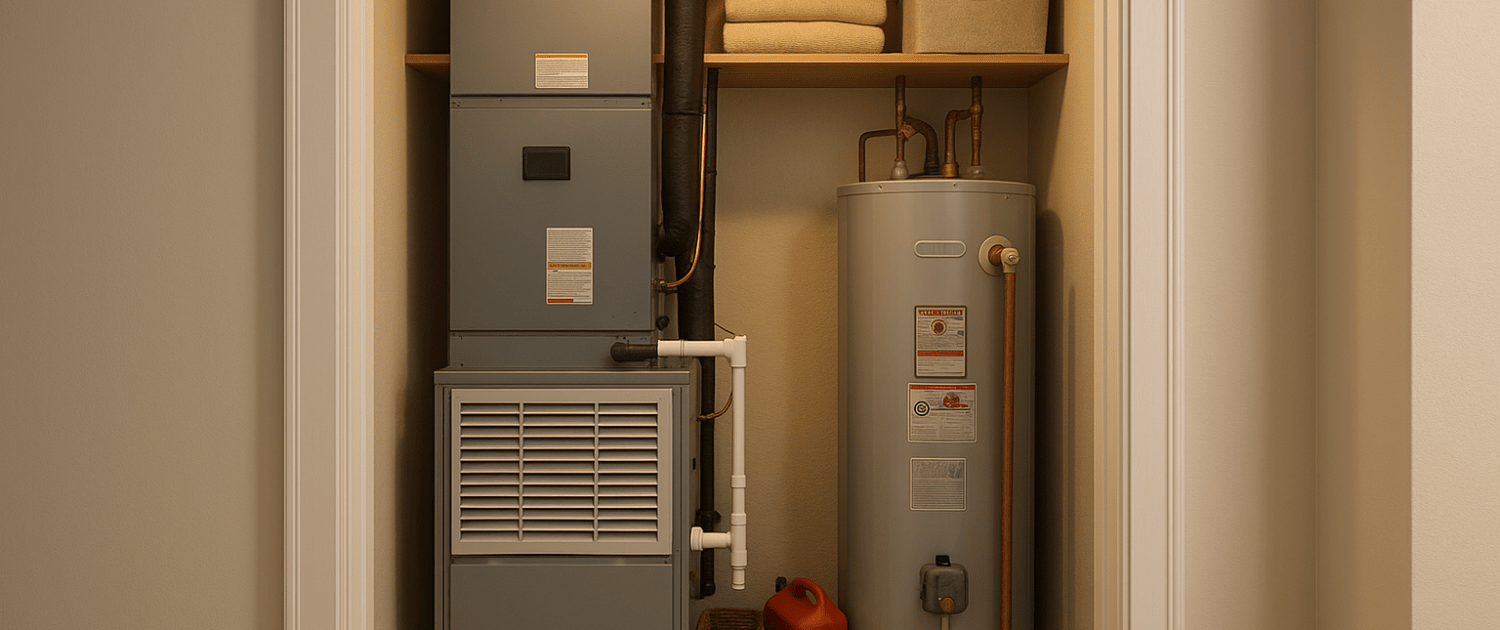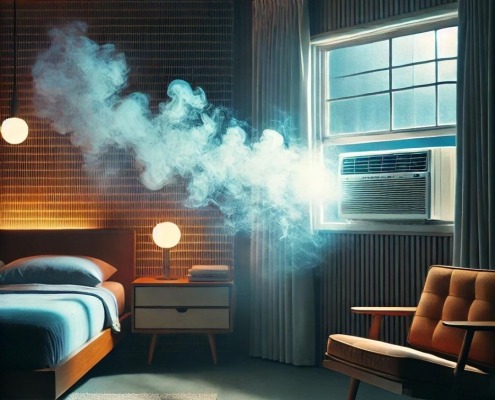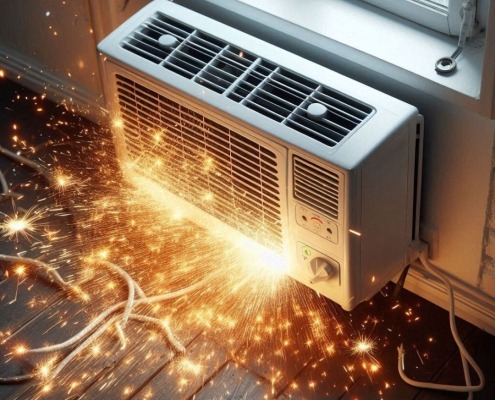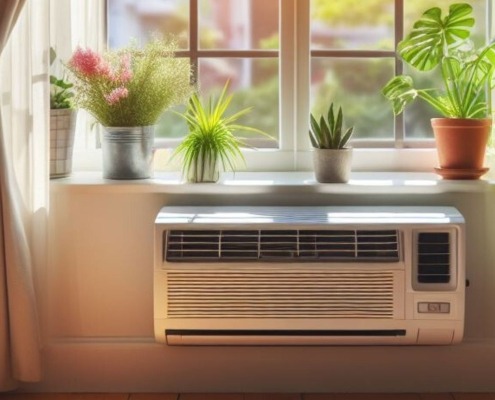Learn How a New Central AC Filter Will Help Your Wallet and Home
Steven E / Tuesday July 1, 2025
When it comes to home maintenance, air conditioning filters can often fly under the radar. They’re small, inexpensive, and easy to overlook, until something goes wrong. But neglecting to change your central AC filter can cost you more than just clean air. It can impact your comfort, your system’s performance, and yes, your monthly utility bills.
We’ll break down why changing your central AC filter regularly is essential not just for the health of your home, but for the health of your wallet too. Staying on top of this simple maintenance task can save you time, money, and stress.
The information in this article may not apply to your specific appliance model. We recommend consulting your manufacturer’s documentation or contact us with any questions.
What Does a Central AC Filter Do?
At first glance, the air filter in your HVAC system might seem like a simple piece of mesh or cardboard, but it plays a critical role in keeping your system running efficiently and your indoor air clean.
Here’s what your AC filter is responsible for:
- Trapping airborne particles: Filters capture dust, pollen, mold spores, pet hair, and other particles so they don’t circulate through your home.
- Protecting the HVAC system: By keeping debris out of the internal components, the filter reduces wear and tear on parts like the blower motor and evaporator coil.
- Improving indoor air quality: Cleaner air means less respiratory irritation and fewer allergy triggers for your family.
- Maintaining airflow: A clean filter ensures proper air circulation, which helps your system cool more effectively.
When the filter gets clogged, all of these benefits start to break down.
The Risks of a Dirty Filter
A filter that’s packed with dust and debris doesn’t just stop filtering; it actively causes problems. Here’s what happens when you skip filter changes.
Reduced Airflow
When your filter is clogged, your HVAC system has to work harder to push air through. That means your blower motor uses more energy and wears out faster. It also means rooms might not cool evenly, and you’ll notice weak airflow from vents.
Higher Energy Bills
Restricted airflow means your system has to run longer to reach the desired temperature. Longer cycles = more electricity. In fact, a dirty filter can increase your energy consumption by up to 15%, depending on how badly it restricts airflow.
System Overheating and Damage
When your AC runs harder than it should, it can overheat. That’s bad news for key components like your compressor or blower motor. In extreme cases, a clogged filter can cause ice buildup on the evaporator coil, leading to a full system shutdown.
Poor Air Quality
A dirty filter can’t trap new dust, pollen, or pet dander effectively. That leads to more particles circulating in the air, settling on furniture, and potentially triggering allergies or asthma symptoms.
Shortened HVAC Lifespan
Excessive wear and tear on the system from a neglected filter can take years off your AC’s expected lifespan. That means you could be looking at a premature replacement, an expense no one wants.
How Often Should You Change Your AC Filter?
There’s no universal answer, but there are general guidelines based on usage, environment, and the type of filter you use.
General Recommendations
- Fiberglass filters: Every 30 days
- Pleated filters (1–2 inches thick): Every 60–90 days
- High-efficiency media filters: Every 6–12 months (check manufacturer guidelines)
Change More Frequently If:
- You have one or more indoor pets
- Someone in your home has allergies or asthma
- You smoke indoors
- You live in a high-pollen or dusty area
- Your system runs for long times in extreme heat
Pro Tip: Check your filter monthly. If it looks gray, dusty, or clogged, it’s time to replace it, even if it hasn’t hit the suggested change interval yet.
Signs It’s Time to Change Your Filter
Not sure if your filter’s past its prime? Your HVAC system will often give you clues. Watch for these common warning signs:
- Weak airflow from vents
- System runs longer than normal to reach the set temperature
- Spike in energy bills
- Increased dust buildup on furniture
- Visible dirt on the filter itself
- Musty or stale indoor air odors
How to Replace Your Central AC Filter
This is one of the easiest and most valuable DIY tasks you can do as a homeowner. You don’t need any tools, and it only takes a few minutes.
- Turn off the AC unit at the thermostat for safety.
- Locate the filter. It’s usually found in the return air vent or inside the air handler/furnace.
- Remove the old filter and note its size. Most filters have the dimensions printed on the frame.
- Insert the new filter with the arrows pointing in the direction of airflow (typically toward the blower motor).
- Close the cover and turn the system back on.
Pro Tips
- Keep extra filters on hand so you’re not scrambling when it’s time to change one.
- Mark your calendar or set a reminder on your phone to check the filter each month.
- Write the date of installation on the filter frame to track how long it’s been in use.
Choosing the Right Filter for Your Home
Not all filters are created equal. Your choice of filter affects not just air quality, but also system performance. Here are the main types:
Fiberglass Filters
- Inexpensive
- Short lifespan (30 days)
- Basic protection
- Best for homes without allergy concerns
Pleated Filters
- Better particle capture
- Lasts 2–3 months
- Comes in various MERV ratings
- A solid choice for most homes
HEPA Filters
- Traps 99.97% of particles
- Great for allergy sufferers
- May require HVAC system compatibility check
- Higher upfront cost
Media Filters
- Large surface area
- Long lifespan (6–12 months)
- Installed in special housing
- Excellent filtration with minimal airflow resistance
MERV Ratings Explained
The MERV scale (Minimum Efficiency Reporting Value) rates filters from 1 to 16.
- MERV 6–8: Basic residential use
- MERV 9–12: Better filtration for pollen, mold, and dust mites
- MERV 13–16: High filtration for bacteria and smoke (check system compatibility)
Avoid going too high on the MERV scale if your system isn’t built for it, restricting airflow can do more harm than good.
Don’t Let Neglect Cost You Comfort
Your central AC system isn’t just about cooling; it’s about your comfort, health, and financial well-being. And while it’s easy to forget about something as small as an air filter, it’s one of the most impactful maintenance tasks you can take on.
A clean filter helps your system run smoother, your home stay cooler, and your wallet stay a little thicker. It’s the kind of win-win that every homeowner should take advantage of.
Where To Find Us
If you need any replacement parts for your appliances, you can enter your model number at AppliancePartsPros.com to locate and order them quickly. Most orders arrive in just two business days, and we have tons of great information in our repair help section and YouTube videos to help you troubleshoot.
Stay connected with the latest DIY tips, tutorial videos, and repair guides by following us on Facebook, Instagram, and Twitter. We love hearing about your repair stories and successes. If you need more help or want personalized guidance, feel free to reach out. We’re ready to help you take on your next project with confidence!
With nearly a decade of experience in providing top-notch customer service regarding appliance parts and repair, Steven enjoys sharing practical advice, troubleshooting tips, and interesting information to help readers stay informed.





